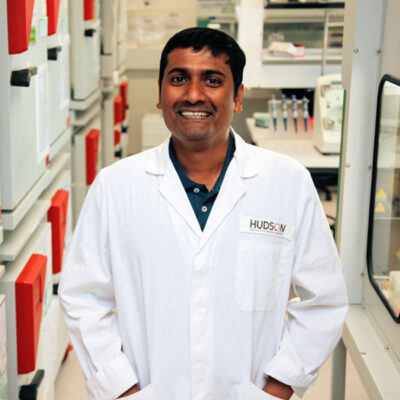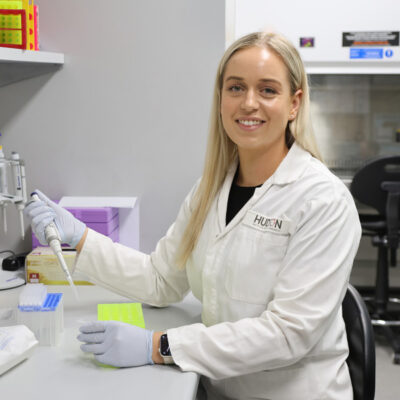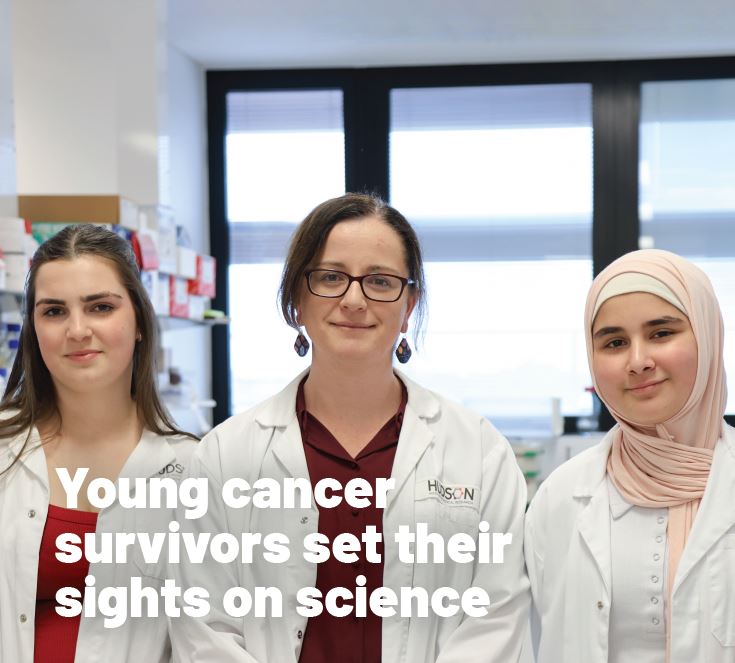Closing the gap in tissue engineering
By Hudson Institute communications
A world-first discovery led by Dr Shayanti Mukherjee has found materials called perovskites—commonly used in solar cells production—have anti-microbial properties, without toxic side effects to human cells.

Dr Mukherjee and her team, who already have a significant program researching new bio-degradable nanomeshes to revolutionise treatments for pelvic organ prolapse (POP), have shown for the first time that perovskites can be used as additives to engineer human tissue implants.
The discovery has widespread implications for developing new treatments for wound healing and for several other conditions requiring devices to be implanted into patients.
Dr Mukherjee said the discovery was crucial in her lab’s ongoing efforts to progress research on new treatments for POP, a debilitating condition where the pelvic floor muscles become damaged, causing organs to shift or ‘drop’ into the vagina (see Fact box below).
The study, published in the journal, Nanomaterials, showed that the silver-based perovskite had strong anti-microbial properties and is non-toxic to human cells, possibly due to its low concentration.
“We need really, basic fundamental discovery science to improve treatments for pelvic organ prolapse,” Dr Mukherjee said. “This will be a critical step in our ongoing programs for revolutionising our treatments for POP,” she said.
“These perovskites have anti-microbial effects but promote the growth and proliferation of human cells without toxicity.”
In the study, silver-based perovskite particles were added to a polymer solution and spun for many hours using high-voltage in a process known as electrospinning. This produces ultra-fine mesh from nanofibrous strings, which mimic the nano-architecture of our body’s own tissues.
The result is a 95 per cent porous mesh which provides a favourable platform for human cells to anchor to and grow—a crucial requirement for implants. Dr Mukherjee said the discovery was like finding the ideal ingredient to perfect a recipe. “Perovskite particles blended in the polymer mesh act like chocolate chips in cookies – giving just the right amount of, in this case, ‘anti-microbial’ flavour,” Dr Mukherjee said.
“When making a mesh with additives such as silver-based perovskites, the biggest risk is that it is toxic to human cells,” Dr Mukherjee said. “We have shown that this ingredient is not toxic. In fact, the human cells grow really well and express the proteins that they need to.”
Dr Mukherjee said the next step would be to investigate the application of the research further in the development of biodegradable nanomeshes to treat POP.
Why do we need new treatments for POP?
Transvaginal meshes for the treatment of pelvic organ prolapse have been associated with severe adverse events and have been banned from clinical use in many countries.
Meshes for POP treatment in Australia were banned in 2017, mainly due to the undesirable foreign body response to synthetic non-degradable meshes. Therefore, there are very few reliable treatment options for POP.
What is POP?
Pelvic organ prolapse develops when tissues, pelvic floor muscles and ligaments that support the pelvic organs (bladder, uterus and bowel), become damaged, usually in childbirth, causing organs to shift or ‘drop’ into the vagina or even outside the body. This can lead to debilitating symptoms, including poor bladder or bowel control and pain during sex.
The condition can be exacerbated by age, ethnicity, multiple births, obesity and family genetics. Menopause also has an effect. One in two postmenopausal women who have had children will experience POP, compared to one in four generally. Up to a third of women with POP require multiple treatments in their lifetime.
Collaborators | Prof Seeram Ramakrishna (National University of Singapore) and Dr Aleksanker Gora (Sport & Fashion Management Pte. Ltd., Singapore)
This research was supported by | Science and Industry Endowment Fund (SIEF), and NHMRC
In this article
About Hudson Institute
Hudson Institute’ s research programs deliver in three areas of medical need – inflammation, cancer, women’s and newborn health. More
Hudson News
Get the inside view on discoveries and patient stories
“Thank you Hudson Institute researchers. Your work brings such hope to all women with ovarian cancer knowing that potentially women in the future won't have to go through what we have!”





